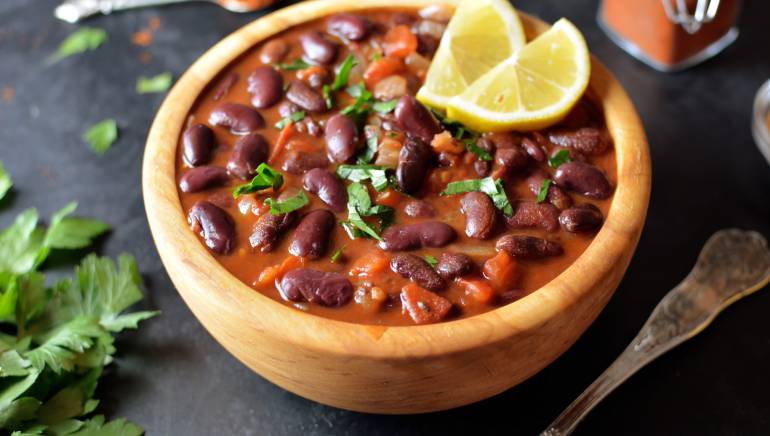
8 Compelling Reasons to Include Kidney Beans in Your Diet for Better Health
2 months ago | 5 Views
Kidney beans are frequently associated with gastrointestinal issues such as discomfort, bloating, and gas. The consumption of these beans, which are shaped like kidneys, may lead to an upset stomach. However, it is important not to dismiss them entirely, as these adverse effects typically occur when the beans are improperly cooked or eaten in large quantities. In reality, kidney beans should be included in a well-rounded diet due to their rich nutrient profile, which includes protein, fibre, and potassium. They offer advantages for both heart health and digestive function. Additionally, individuals with diabetes can safely incorporate these deep red beans into their meals. If you are interested in learning more about the advantages of kidney beans, here are some ways they can be beneficial.
Nutritional value of kidney beans
Hundred grams of these beans have the following nutrients, according to the U.S. Department of Agriculture:
- Protein: 7.69 grams
- Carbohydrates: 21.5 grams
- Fibre: 5.4 grams
- Calcium: 46 mg
- Iron: 1.38 mg
- Potassium: 215 mg
- Calories: 123 kcal
- Folate (Vitamin B9): 130 mcg
- Magnesium: 45 mg

What are the health benefits of kidney beans?
Here’s a look at the key health benefits of kidney beans:
1. Rich in plant-based protein
The nutrient-rich legume serves as an excellent source of plant-based protein, making it an ideal choice for vegetarians. Nutritionist Garima Chaudhry notes, "Due to its high protein content, the beans can facilitate muscle growth and repair, aid in maintaining satiety, and help curb cravings."
2. Assists in weight management
These beans are low in fat while being rich in dietary fibre and protein, making them particularly suitable for individuals aiming to control their weight. According to the expert, "Fiber can slow digestion and promote a feeling of fullness, while protein can enhance metabolism and diminish hunger."
3. Aids in regulating blood sugar levels
This superfood boasts a low glycemic index (GI), which results in a gradual and stable increase in blood sugar levels. Kidney beans are classified as low GI foods, making them appropriate for individuals with type 2 diabetes, as indicated by research published in Frontiers In Nutrition in 2022.
4. Enhances cardiovascular health
"They are rich in potassium and magnesium, which are beneficial for heart health," states Chaudhry. Elevated blood pressure is a known risk factor for heart disease and heart attacks. "These beans can help lower blood pressure due to their high potassium content," the expert explains.
5. Promotes digestive wellness
Rich in dietary fibre, these beans can enhance digestion when consumed in appropriate amounts. "They nourish beneficial gut bacteria, thereby improving gut microbiome health. The fibre in this superfood can also increase stool bulk and prevent constipation," the expert adds.
6. May reduce cancer risk
The expert states that these substances are composed of antioxidants and phytochemicals such as polyphenols, flavonoids, and lignans, which may contribute to cancer prevention. A study conducted in 2009 and published in Cancer Causes & Control identified a correlation between increased consumption of legumes, particularly kidney beans, and a reduced risk of various cancers, including those of the stomach, colorectum, and kidneys.
7. May support brain function
One notable advantage of kidney beans pertains to cognitive health. The presence of B vitamins, folate, and magnesium in these beans may enhance brain function and promote emotional stability. According to the expert, "Folate and iron assist in the production of red blood cells, thereby ensuring an adequate oxygen supply to the brain."
8. Enhances bone and joint health
This superfood is rich in nutrients that support bone health, including calcium and magnesium, making stronger bones a significant benefit of kidney beans. The expert states, "Calcium is one of the most effective means to fortify your bones and prevent osteoporosis, while magnesium can enhance bone mineral density."
To fully enjoy the benefits of kidney beans, it is recommended to consume 1/2 to 1 cup daily. The expert advises, "Be sure to soak them for approximately 8 hours and cook them thoroughly before consumption."

How to eat kidney beans?
One can reap the advantages of kidney beans through various preparations:
- Rajma (Indian kidney bean curry): This is a savoury and protein-rich dish that pairs well with rice or roti (Indian flatbread).
- Kidney bean salad: Combine them with tomatoes, onions, cucumbers, and bell peppers for a refreshing salad.
- Kidney bean soup: Prepare a warm and nourishing soup that is abundant in plant-based protein.
- Kidney bean stir-fry: A straightforward and flavorful stir-fry that serves as an excellent side dish.
- Kidney bean hummus: A delicious alternative to traditional hummus, perfect for dipping with snacks.
While kidney beans offer numerous benefits, they also come with potential side effects:
- Toxicity from raw or undercooked kidney beans: They contain phytohaemagglutinin, a toxin that can induce food poisoning, resulting in symptoms such as vomiting, diarrhoea, and abdominal pain within 1-3 hours of consumption.
- Digestive issues: The presence of oligosaccharides, a type of carbohydrate that is challenging to digest, can lead to fermentation in the gut, causing gas and bloating.
- Antinutrients that hinder nutrient absorption: Kidney beans contain phytates (phytic acid) and lectins, which may obstruct the absorption of vital minerals like iron, calcium, and zinc. Over time, excessive consumption can lead to mineral deficiencies.
- Allergic reactions: Individuals with a legume allergy may experience immune responses to these beans, resulting in skin rashes, itching, and swelling.
- Kidney stones: The oxalates present in kidney beans can contribute to the formation of kidney stones, particularly in those predisposed to this condition.
While kidney beans can promote better heart health, aid in weight loss, and support digestion, it is crucial to soak and cook them properly to eliminate toxins and enhance digestibility. Additionally, consuming them in moderation will allow one to enjoy their benefits while minimizing potential side effects.
Read Also: New Study Reveals: You Can Be Overweight and Healthy by Focusing on This One Key Factor
Get the latest Bollywood entertainment news, trending celebrity news, latest celebrity news, new movie reviews, latest entertainment news, latest Bollywood news, and Bollywood celebrity fashion & style updates!





















